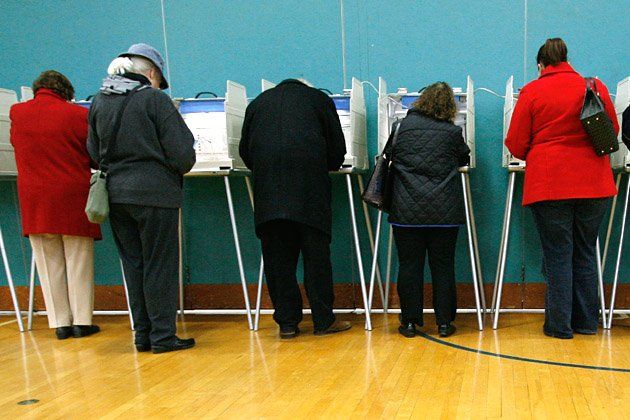
Calculating the impact of the BP spill on the midterm elections is almost as hard as measuring the flow of oil from the hole in the ocean floor. Everybody's got their own assessment. As President Obama scrambled to prevent the burgeoning ecological crisis from turning into a political nightmare, late-night talk-show host Jay Leno observed that among the species facing extinction as a result of the spill, "the odds-on favorite is Democrats."
In between ramping up his involvement with the spill, Obama did three fundraising events for California's Barbara Boxer, one of several endangered Senate Democrats trying to hold on in a political environment shaping up to favor Republicans. While it's unlikely that the GOP will pick up all 10 seats needed to gain control of the Senate, what's going on is reminiscent of 1980, when the GOP won the Senate by knocking off a bunch of Democratic stalwarts, among them former presidential candidate George McGovern. Six years later, many of the victors, including McGovern's successor, would be turned out by the voters in what proved a short-lived majority.
The Republicans picked up 12 seats in '80, riding the coattails of Ronald Reagan's electoral triumph, but the bulk of the winning class had no staying power. They were perfect for the moment, but, to put it gently, not all had the look of eagles. Their ascendancy was accidental, the product of an insurgent year for the GOP and a historical anomaly that repeats itself with some regularity in American politics. "When you have an extraordinary sea-change election, the sea washes people in and some of them leave footprints in the sand, and some never do, as if they never arrived; it's the force of an election dynamic," explains a Senate aide who does not want to be named seeming to disparage those who are swept in.
The most famous member of the 1980 Republican class was Dan Quayle, whose surprise victory over liberal Democratic icon Birch Bayh in Indiana anointed him as a giant-killer. Unlike many of his classmates, Quayle did win a second term, and was then plucked from the Senate to run for vice president in 1988 with George H.W. Bush. Quayle's youth and good looks were thought to be assets, but his four years in the White House were painful, for him and for the country, as his inexperience and lack of gravitas made him the object of jokes.
Among the notable one-term wonders elected in '80 were Paula Hawkins of Florida, a onetime consumer activist, and Jeremiah Denton of Alabama, a former Vietnam POW. Both were political novices who rode the Reagan wave and are remembered more for their personal eccentricities than any legislative achievement. The phenomenon of senators who have little impact is not limited to any one election or party. Senators come and go, and in a hothouse political environment, only a handful sustain a career long enough to go down in history as one of the greats.
This is an off-year election, and there's no popular politician with coattails to ride, but the voters are restive, and that's always dangerous for the party in power. Exhibit A is Rand Paul, the libertarian eye doctor who upended his party's chosen nominee for an open Senate seat in Kentucky. His doctrinaire views led him to question the wisdom of the 1964 Civil Rights Act, a plunge into America's past that in another election year might doom his candidacy. But this year his supporters are commending his lack of political wiles.
Another candidate who has lurched to unlikely electoral prominence is Linda McMahon, the former CEO of World Wrestling Entertainment. We don't know enough about her yet, other than the fact that she's prepared to spend $50 million of her own money to win a Senate race in Connecticut, where there are fewer than 2 million registered voters, a cost per capita that should break a record. Her Republican primary opponent, Rob Simmons, a Vietnam veteran, backed out of the race, saying he couldn't compete with her money, and warning that some of the practices associated with the WWE will make voters queasy and go to McMahon's character.
The two leading candidates to oppose Senate leader Harry Reid, one of the most endangered Democrats, seem just as unlikely to last on the national scene should they succeed in November, as James Abdnor did as McGovern's replacement 30 years ago. GOP frontrunner Sue Lowden opposes Obama's health-care reform and proposed a bartering system modeled after a time when her grandparents brought a chicken to the doctor's office as payment. Her chief rival for the GOP nomination is Tea Party candidate Sharron Angle, who is being touted as the next Rand Paul, which, depending on your viewpoint, can be a good or bad thing.
Surveying the landscape for November, Democrats should take heart. It could be a long six years, but the tide that washes in some of these outliers will be there to carry them out, just as it has in elections past.
Eleanor Clift is also the author of Two Weeks of Life: A Memoir of Love, Death, and Politics and Founding Sisters and the Nineteenth Amendment.
Uncommon Knowledge
Newsweek is committed to challenging conventional wisdom and finding connections in the search for common ground.
Newsweek is committed to challenging conventional wisdom and finding connections in the search for common ground.





